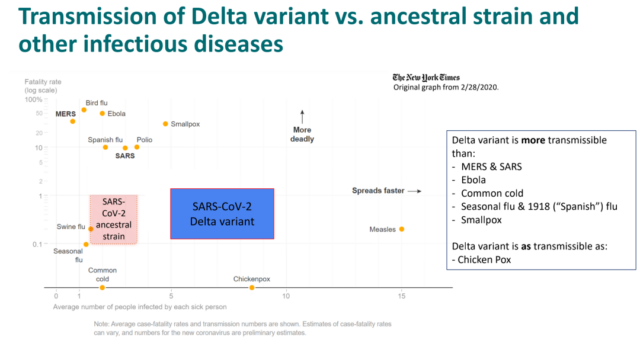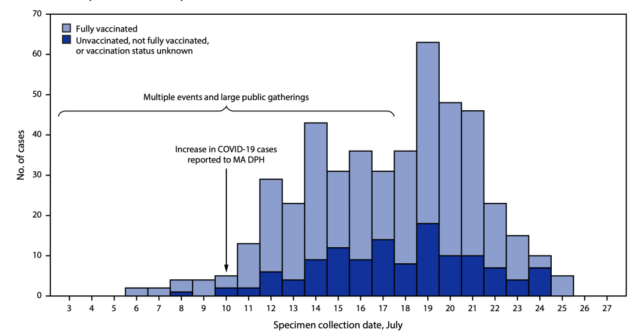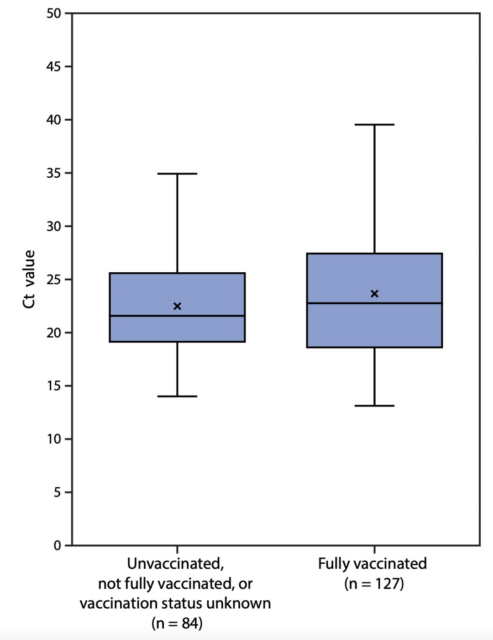Are COVID-19 vaccines still effective against the Delta strain?
- Normal Liver Cells Found to Promote Cancer Metastasis to the Liver
- Nearly 80% Complete Remission: Breakthrough in ADC Anti-Tumor Treatment
- Vaccination Against Common Diseases May Prevent Dementia!
- New Alzheimer’s Disease (AD) Diagnosis and Staging Criteria
- Breakthrough in Alzheimer’s Disease: New Nasal Spray Halts Cognitive Decline by Targeting Toxic Protein
- Can the Tap Water at the Paris Olympics be Drunk Directly?
Are COVID-19 vaccines still effective against the Delta strain? CDC discloses key information
Are COVID-19 vaccines still effective against the Delta strain? After the vaccination was completed, people infected with the Delta mutant strain had no significant difference in viral load compared with those who had not been vaccinated.
On July 30, the United States CDC (hereinafter referred to as CDC) a document on the effectiveness of Delta variant strains and vaccines was exposed by the media.
Subsequently, the CDC published the details of this document on its official website, reminding us: Delta variants are extremely capable of spreading. Strong, the ability to break through the existing vaccines in the United States is also stronger than other mutants, and confirms a worrying fact-after the completion of vaccination, people infected with the Delta mutant strain are compared with those who have not been vaccinated.
There is no significant difference in capacity. The CDC pointed out that these vaccinated infected people also have the ability to spread the epidemic, and proposed that the epidemic prevention strategy should be changed, and the vaccinated population should also pay attention to protection and wear masks.
A person infected with Delta can infect 8-9 people
The CDC pointed out in the document that the current Delta variant has the same transmission ability as chickenpox, and an infected person can infect about 8-9 people.

In the figure above, the ordinate represents the lethality intensity, and the abscissa represents the transmission intensity. As can be seen from this picture, the Delta mutant strain has completely opened the gap with the early wild-type new coronavirus in terms of transmission ability, and its lethality is also higher than that of the wild-type — but the specific increase is actually still Under research.
The transmissibility of Delta variants is not only stronger than that of wild-type COVID-19, but also stronger than SARS, MERS, Ebola, common cold, influenza and smallpox. Chickenpox, which has a similar transmission ability, is far less lethal than it.
Higher viral load and reinfection ability than Alpha mutant
According to the report, among patients with breakthrough infection after vaccination, patients infected with the Delta mutant strain had a viral load 10 times higher than those infected with the Alpha mutant strain. And Delta has a higher risk of repeated infections than Alpha, about 1.46 (95% confidence interval: 1.03-2.05) times.
In terms of severe illness, the Delta mutant strain also causes more serious consequences than the Alpha mutant strain. It should be noted that the Alpha mutant strain itself is stronger than the wild-type mutant in spreading power and lethality, but compared with other major mutant strains, it lacks immune escape ability.
The CDC cited data released by Singapore showing that compared to wild type, Alpha’s total risk of oxygen (heavy), ICU (critical) and death is 1.88 (95% confidence interval: 0.30-14.76) times, and Delta is 4.90 (95%) The confidence interval is 1.43-30.78) times.

Research data from Singapore papers
The Canadian data cited by the CDC is a direct comparison between Delta and other N501Y variants (including Alpha/B1.1.17, Beta/B.1.351 and Gamma/P.1 variants). The results are still not optimistic-statistics show that Delta Compared with the other three variants, the risk of hospital admission is 1.55 (95% confidence interval: 1.45-1.63) times of the latter, the risk of ICU is 2.01 (95% confidence interval: 1.79-2.24) times, and the risk of death is 1.59 ( 95% confidence interval: 1.39-1.84) times.

Research data from Canadian papers
Compared with those who were vaccinated, those who were not vaccinated, No difference in Delta viral load
The most important news that ignited public opinion in the CDC’s internal documents is probably that patients who were infected with the Delta mutant after being vaccinated have the same viral load as those who have not been vaccinated. Indeed, there is indeed such a paragraph in the document (see the picture below), and the CDC even bolded the “no difference” itself.

Screenshot of the original CDC file
This discovery also led the CDC to believe that patients infected with Delta after vaccination have the same ability to spread the epidemic as those who have not been vaccinated.

Screenshot of the original CDC file
Therefore, the US CDC proposes that people after vaccination need to strengthen epidemic prevention, wear masks, and consider other epidemic prevention measures from a strategic level.
After learning of this news, some mainstream media, international media and commentators in the United States raised a concern: whether the infected person after vaccination will be asymptomatic for longer due to vaccination, and because the viral load does not decrease, It is more likely to infect others. These people relax their vigilance after vaccination, which will also lead to the spread of the epidemic.
A paper analyzing breakthrough infections published by NEJM also put forward this point of view-after a breakthrough infection occurs, a vaccinator may infect more people without knowing it, especially those with more vulnerable health.
Details of the mass breakthrough infection outbreak in Massachusetts, 80% of hospitalized cases completed vaccination
Subsequently, the CDC announced the details of this cluster of breakthrough infections.

CDC official website article title
This cluster of outbreaks occurred in Barnstable County, Massachusetts, and 469 cases of infection occurred during July, which is believed to be related to summer gatherings in the area.
According to statistics, the vaccination rate of local residents in Massachusetts is 69%. In this local epidemic, 346 of the 469 patients have completed all vaccination, accounting for 74% of all cases. In other words, vaccinated people may have a higher infection rate than unvaccinated people, which may be caused by vaccinated people who are more relaxed.
Among the infected patients, a total of 5 were hospitalized, and 4 of them completed the vaccination. As of July 27, no deaths were reported. Among the infected people who have completed the vaccination, 79% have symptoms. The CDC article mentioned in the discussion that there may be more asymptomatic infections that have not been detected due to detection bias.
CDC statistics pointed out that there is a fairly obvious correlation between large-scale gatherings and the increase in the number of infections, and released a corresponding statistical chart——

The above figure shows that there were a number of large public gatherings held in the area in mid-to-early July, and the number of infected cases gradually began to rise from mid-July. There is a certain time difference between the start of the gathering and the sharp increase in the number of infections ( In this case it is about 10 days). The light part in the figure represents the number of cases that have completed vaccination, and the dark part represents cases that have not been vaccinated, not vaccinated, or whose vaccination status is unknown.
Testing of 127 infected persons who completed vaccination and 84 uninfected, unvaccinated (at least 65 people) and unidentified infected persons found that there was no significant difference in viral load between the two parties.

There is no significant difference in the cycle threshold of the two parties, that is, there is no difference in the number of replications that the virus reaches the threshold in the two bodies
Regarding this situation, the CDC has not announced whether the same viral load affects the development of the disease or whether it affects long-term sequelae, etc., nor has it explained why the infection after vaccination has the same viral load as those who have not been vaccinated. And believe that this report is temporarily unable to make a conclusion on whether the vaccine can effectively fight against the new coronavirus variants (including Delta).
(source:internet, reference only)
Disclaimer of medicaltrend.org
Important Note: The information provided is for informational purposes only and should not be considered as medical advice.



